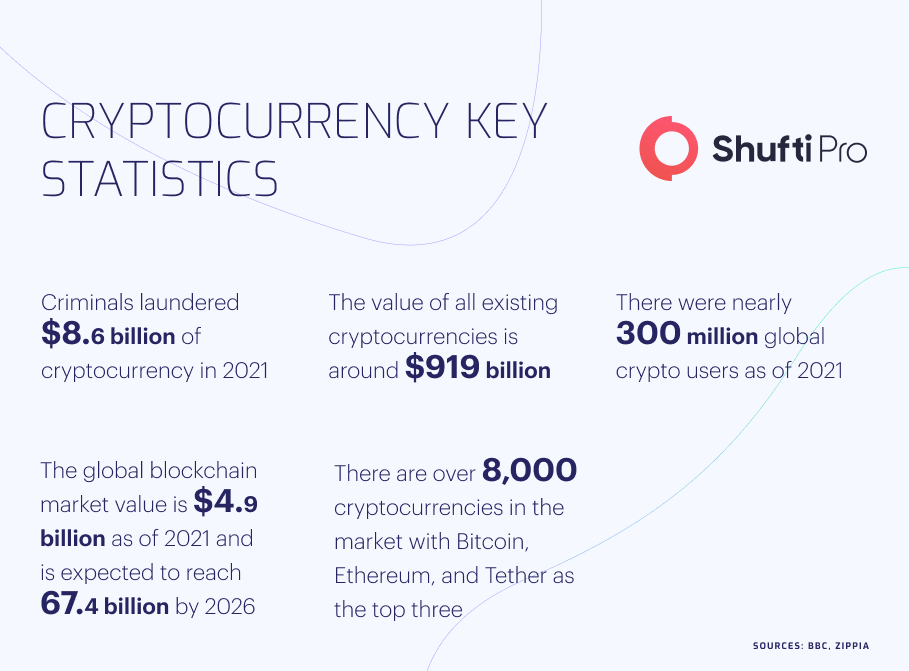Evolving Regulations Shaping Digital Crypto Ecosystem – How Shufti Can Help

Since the start of civilization, humans have used money in several different ways, and throughout history, both usage and form of currency have evolved. Crypto is the most innovative form of e-currency with a huge potential for investment and business. Huge demand in the crypto market and the expansion of the industry brought with it the necessity of regulations. Although cryptocurrency does not have strict measures as fiat currencies, global financial organizations are working tirelessly to form a comprehensive framework for monitoring this crucial sector.
In 2021, the global cryptocurrency market size reached $1782 billion, with an expectancy to rise at an annual rate of 58% by 2027. Unlike banks and other financial companies, the crypto industry has not implemented stringent regulations to curb monetary fraud, which has helped criminals to exploit loopholes and get involved in different scams. The bad actors are using more sophisticated ways to carry out crimes, particularly money laundering and terrorist financing, making it mandatory for regulatory authorities to implement strict screening measures.
Insight into Cryptocurrency Industry [2022 Overview]
In a few years, cryptocurrency has gained huge popularity among investors due to its decentralized nature and absence of any third party in transactions. Although the first half of 2022 went really bad for the crypto market due to high devaluation, it is expected to rise again within a year. Bitcoin and Ethereum which are the most popular cryptocurrencies are down by more than 50% compared to their worth in 2021. Despite the falling prices, investors’ interest in crypto remains high, and people are still putting money in the market to gain profits in the near future.
The overall cryptocurrency market has fallen below $1 trillion in 2022 but experts are just terming it as an industry evolution. One of the reasons behind the devaluation of cryptocurrency is thought to be the lack of strict monetary regulations and its vulnerability to financial crimes. Due to rising cases of monetary scams, a large number of investors sell their digital assets resulting in the sudden depreciation of cryptocurrencies. In the wake of this, all major jurisdictions are legislating laws to monitor the crypto market, and experts are predicting that strict regulations will ensure more stability in the volatile cryptocurrency industry.
Prevailing Risks of Money Laundering in the Crypto industry
Due to lack of stringent regulations, cryptocurrencies have made it easier for criminals to invest their illicit money in different coins or tokens making it hard to trace. In 2021 alone, $8.6 billion was laundered using crypto firms which were 30% more than the previous year. The Financial Action Task Force (FATF); a global authority monitoring money laundering, has also highlighted the risks of financial crimes through crypto firms. FATF has issued a set of red flag indicators and made it mandatory for all countries to enhance Know Your Customer (KYC) and Anti-Money Laundering (AML) measures.
Currently, a large number of online businesses like Tesla and Microsoft are accepting cryptocurrencies as payments, which has further raised the risks of money laundering. The criminals are now making luxury purchases through cryptocurrency using illicit funds and law-enforcement authorities remain unable to track transactions due to absence of Anti-Money Laundering (AML) measures. Considering the escalating crimes through crypto exchanges, it has become mandatory for all firms to implement a robust solution to counter criminals and report suspicious activities.

Crime Cases Involving Crypto Money Laundering
With transforming technologies, criminals are using advanced techniques to carry out financial scams. Not only the crypto exchanges but investors are also at high stakes of monetary losses as fraudsters are exploiting loopholes to steal identities of users. Let’s have a look at some of the high-profile cases related to money laundering through cryptocurrency.
Crypto Criminals Laundered $540 Million in the US
US law-enforcement authorities have identified a network of criminals who were involved in money laundering using a crypto service, RenBridge. The fraudsters have been laundering crime-related cash to other countries since 2022, and during this time, they managed to launder $540 million out of the US. The investigations have found that scammers took advantage of the decentralized nature of cryptocurrencies and converted illicit cash to legal assets without leaving any trail. Police have highlighted the need for effective AML measures to counter fraudsters and help officials track down culprits.
UK Police Seized $160 Million in Crypto Money Laundering Investigation
British detectives have seized $160 million worth of illicit crypto coins in an ongoing money laundering raid. Police have termed it one of the largest seizures of crypto assets in the country. The investigations have found that criminals were investing drug money into crypto exchanges and then getting amounts withdrawn in different countries.
Changing Landscape of Global Cryptocurrency Regulations
Due to increasing threat of money laundering and terrorist financing, all the major jurisdictions are legislating and adopting strict laws against cryptocurrency crimes. FATF has also taken firm steps to form a framework and guide all the member-states to ensure compliance with them.
Asia
Asia has the biggest digital economies, and several countries of the continent have not implemented robust measures to curb crypto crimes. In recent times, China has taken a hostile stance towards cryptocurrencies banning all exchanges. The authorities have termed that the crypto sector is exposed to huge threats of money laundering due to which they cannot let it operate in their country.
Moreover, other economies in the region, particularly South Korea and Thailand, have also stressed the need for efficient Know Your Customer (KYC) and AML checks to track all users’ financial transactions.
Europe
European officials have recently signed a landmark agreement that will be the first regulatory regime for the crypto industry. The meeting was held in Brussels by EU authorities along with all member states, and it has been decided to enforce strict AML measures restricting financial criminals. A separate institution, Markets in Crypto-Assets (MiCA), has also been formulated, which will be responsible for monitoring all the crypto exchanges in European countries along with taking strict action against fraudsters.
North America
Financial Transactions and Reports Analysis Centre (FINTRAC) is the primary authoritative body monitoring all the crypto transactions within and out of the country. FINTRAC has updated the KYC regulations and advised all crypto firms to incorporate a system of identity verification while keeping records of all users.
While in the US, crypto exchanges are legal and monitored under the Bank Secrecy Act (BSA). Financial Crimes Enforcement Network (FinCEN) is the organization that enforces and monitors all crypto transactions while countering criminals. In the recent past, it has brought a large number of criminals under the law through crackdowns and raids.
How Shufti Can Help
Combating financial crimes, particularly money laundering and terrorist financing in crypto industry, has become mandatory to ensure transparency. Cryptocurrency is here to stay, and it is the right time for companies to invest in Know Your Customer (KYC) and Anti-Money Laundering (AML) solutions.
Shufti’s state-of-the-art KYC and AML services are efficient enough to help crypto firms comply with global regulatory standards. Powered by thousands of AI algorithms, it has access to 1700+ global sanctions lists and screens data against them to identify criminals. Shufti’s KYC and AML solutions generate results with 98.67% accuracy in less than a second.
Want to know more about KYC/AML solutions for crypto exchanges?

 Explore Now
Explore Now













